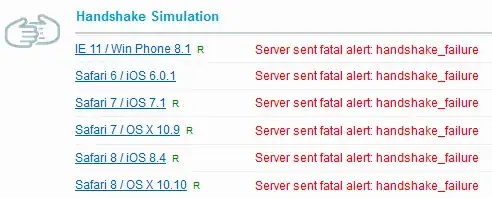I have just performed a test on my personal webiste via SSLlabs.com and I'm apparently supporting some weaker ciphers. I've managed to improve several settings (like CAA), but I'm getting stuck at the ciphers.
I've been looking around a bit, but can't really find a method to determine which can be disabled, and which should remain allowed.
Is there a method I can apply, or some check, or a list of current smart config? I'm assuming I can't just turn of all ciphers marked 'weak' if I want at least a mayority support (It's a private server for some small projects, you may assume modern hard-/software accesses it).
If it helps, this is the list:
TLS_ECDHE_RSA_WITH_CHACHA20_POLY1305_SHA256 (0xcca8) ECDH x25519 (eq. 3072 bits RSA) FS 256
TLS_ECDHE_RSA_WITH_AES_128_GCM_SHA256 (0xc02f) ECDH x25519 (eq. 3072 bits RSA) FS 128
TLS_ECDHE_RSA_WITH_AES_256_GCM_SHA384 (0xc030) ECDH x25519 (eq. 3072 bits RSA) FS 256
TLS_DHE_RSA_WITH_AES_128_GCM_SHA256 (0x9e) DH 2048 bits FS 128
TLS_DHE_RSA_WITH_AES_256_GCM_SHA384 (0x9f) DH 2048 bits FS 256
// All below are weak
TLS_ECDHE_RSA_WITH_AES_128_CBC_SHA256 (0xc027) ECDH x25519 (eq. 3072 bits RSA) FS WEAK 128
TLS_ECDHE_RSA_WITH_AES_256_CBC_SHA384 (0xc028) ECDH x25519 (eq. 3072 bits RSA) FS WEAK 256
TLS_ECDHE_RSA_WITH_AES_128_CBC_SHA (0xc013) ECDH x25519 (eq. 3072 bits RSA) FS WEAK 128
TLS_ECDHE_RSA_WITH_AES_256_CBC_SHA (0xc014) ECDH x25519 (eq. 3072 bits RSA) FS WEAK 256
TLS_DHE_RSA_WITH_AES_128_CBC_SHA256 (0x67) DH 2048 bits FS WEAK 128
TLS_DHE_RSA_WITH_AES_128_CBC_SHA (0x33) DH 2048 bits FS WEAK 128
TLS_DHE_RSA_WITH_AES_256_CBC_SHA256 (0x6b) DH 2048 bits FS WEAK 256
TLS_DHE_RSA_WITH_AES_256_CBC_SHA (0x39) DH 2048 bits FS WEAK 256
TLS_RSA_WITH_AES_128_GCM_SHA256 (0x9c) WEAK 128
TLS_RSA_WITH_AES_256_GCM_SHA384 (0x9d) WEAK 256
TLS_RSA_WITH_AES_128_CBC_SHA256 (0x3c) WEAK 128
TLS_RSA_WITH_AES_256_CBC_SHA256 (0x3d) WEAK 256
TLS_RSA_WITH_AES_128_CBC_SHA (0x2f) WEAK 128
TLS_RSA_WITH_AES_256_CBC_SHA (0x35) WEAK 256

